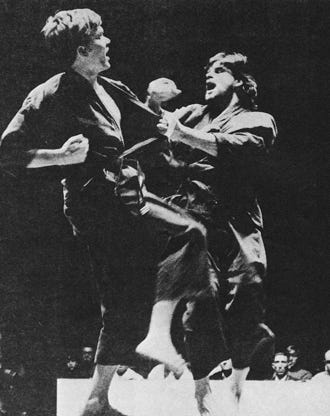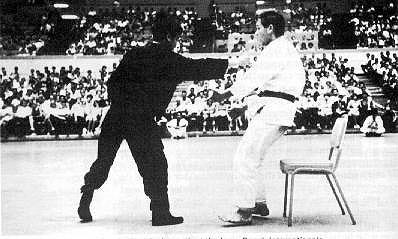Why you should think differently about learning (the future you want depends on it)
Everyone around you agrees on an idea of learning that holds them back. Buck against the crowd -- and get ahead.
The fabled blood and guts era of karate competition is in full swing during the 60s and 70s.
Lean, red-blooded young men step onto hardwood rings and jab at each other’s faces and kick at each other’s ribs, snatching rough canvas sleeves and yanking each other to the unforgiving ground for points.
It’s during this era that Bruce Lee first made a name for himself—by enraging the karate community in California…
He criticized their over-formal training methods, likening them to the same strictures he came to dislike about his own classical kung fu background.
Famously, he said
Absorb what is useful, discard what is not, add what is uniquely your own.
- Bruce Lee
You might think that’s intuitive advice. But most people, in practice, don’t really believe this. They are constrained by the “normal” way of doing things—following “the rules.”
You see, people are pack rats. It’s the “discard what is not useful” part that makes them upset—they just can’t bear to recognize that the proud tradition and “well worn way” they follow might include useless or counterproductive practices.
They cope and justify this maladaptive form of learning and development by saying things like “we already know what works” and “don’t fix it if it ain’t broke.”
The magic of Bruce Lee lives on in his image and his creative work, but sadly his groundbreaking philosophy on learning and personal development has all but washed out of the culture’s memory.
If you want to stay ahead in work and life, you should recover his lost philosophy.
Otherwise…
The old conventional “wisdom” about learning will leave you frustrated, unskilled, and poor.
Here's what everyone else says about learning…
You’re assaulted with these depressing assumptions, that even so-called experts—teachers, no less—rarely challenge and sometimes even regurgitate…
Learning is repetition.
Learning is “good technique” or “perfect form.”
Learning is memorizing.
Learning is linear.
Learning is boring.
Learning is genetic.
Learning is for the young…
It’s just depressing.
Getting good at a new hobby, learning a trade, gaining skills to move up, changing careers—things you need to survive and thrive in the world today—it all seems so insurmountable, so mind-numbing, so soul-sucking, so impossible to achieve.
I can tell you, way back in 2017 when I was broke as a security officer with no professional skills, watching my family careen toward homelessness…
I did not have time for that static.
(In truth, I might have just given up if I had listened to everyone else…)
The TRUTH about Learning…
The good news is this:
Not a single one of those assumptions about learning is true.
New skills that boost your income, create more enjoyment, and improve your life are not as far off as you thought…
Here’s the real truth instead…
Learning is NOT about repetition
Learning is NOT about “perfect form” (it has almost nothing to do with it)
Learning is NOT memorization
Learning is NOT linear (it’s up and down, and it’s more about quality of practice than quantity)
Learning is NOT genetic (you CAN learn just about anything, regardless of who you are)
Learning is NOT boring (in fact, it’s often better if you learn through play)
Learning is NOT based on age (your brain has “plasticity” to learn at any age, from 9 months to 900 months old)
An effective approach to learning is way more interesting, often more fun, and can yield you real results much faster than everyone—even experts—believe.
How did all the experts miss this?
Because they “learn” from each other, not the science. And they all have a complex network of bad presuppositions and limiting beliefs…
They don’t challenge their own limiting beliefs nor the beliefs of each other—and when research produces counterintuitive results, they scoff and ignore it.
It’s stale, it’s rote, it’s dead, it’s hopeless.
Bruce Lee once said, “To me, the function and duty of a quality human being is the sincere and honest development of one’s potential.”
Inspired by Bruce’s philosophy, I discarded all those outdated notions of learning (and their methods with them), quadrupled my income, and saved my family in the process.
I’m about growth. And fun. And hope. And joy.
I’m about realizing the potential that downers say you don’t have, inside of timeframes they assure you are not possible.
What about you?





